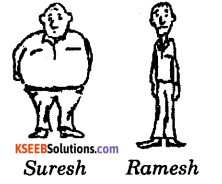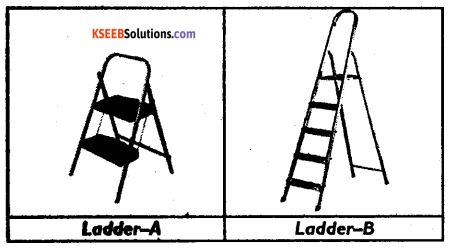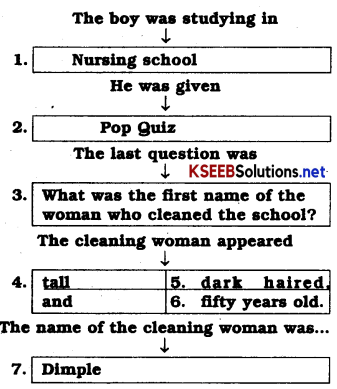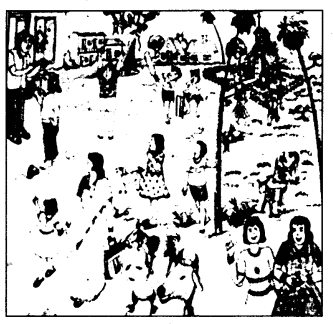KSEEB 10th English Jazz Poem Two Poem Notes Questions and Answers
Understand the Poem
Question 1.
Read the first stanza and see how closely the description of the Jazz player is made and fill in the columns in the table.
Answer:
1. Face : Wrinkled old face / Unshaven / Rough
2. Eyes : Closed eyes/down eyes
3. Jacket : Old and worn
4. Stomach : Sagging
5. Shirt : blue, faded
6. Shoes : run down
![]()
Question 2.
Why do you think the Jazz player keeps his head down? (line 1-6]
Answer:
Just to blow the old saxophone.
Question 3.
The word ‘old’ has been repeated several times in the first two stanzas. What does this suggest?
Answer:
He is old and experienced.
Question 4.
What description do the lines from 13 to 18 suggest about the Jazz player?
Answer:
We get the description of his stomach and his shoes.
Question 5.
(a) Read the lines from 19 to 25 carefully. Is there any change in the stature of the Jazz player?
(b) Now read the lines from 31 to 35. Can you guess what he is meditating on?
Answer:
(a) There is no change.
(b) To preach the Black Gospel of Jazz.
![]()
Question 6.
How has he held his instrument?
Answer:
He has hold it across his chest.
Question 7.
Read the lines from 29 to 41. It gives a picture. Can you imagine that? Try to get that picture in your mind. If you can, draw the picture.
Answer:
It is the picture of a bird.
Question 8.
‘Preaching it with words’ (line 35). What does ‘it’ stand for here?
Answer:
Gospel of Jazz.
Question 9.
‘He is no longer a man’, says the poet (line 37). Who else is he supposed to be if he is no longer a man?
Answer:
He is also a preacher.
![]()
Question 10. Read the last ten words of the poem. You may observe a change in the tone. What is that about?
Answer:
He flies higher and shows his presence.
Read and Appreciate
Question 1.
Usually a poem is written in a stanza form with a rhyme scheme. Check and find out whether this poem follows any rhyme scheme. You may compare this poem with the poem, “Seal” given below.
Answer:
The poem does not follow any rhyme scheme. But we find rhyme scheme in the poem ‘The Seal’.
Question 2.
Refer to the last stanza of Jazz Poem Two’. Do you find anything extraordinary in the shape of the poem? Check the length of each line carefully. Why do you think lines 41, 42 and 43 are different from others? What does it suggest ?
Answer:
We find a different shape in the poem. They have a raising intonation. Just soaring higher. Stressing again that he is a black man again.
![]()
Question 3.
The poem is full of images [word pictures]. Some examples are given. Now find as many images as you can in the poem.
Answer:
(a) wrinkled old face.
(b) sagging stomach
(c) closed eyes
(d) old jacket / run down shoes.
(e) old saxophone across his chest.
![]()
Question 4.
Is there a simile in the poem? If so identify it.
Answer:
He stands like a black Ancient Mariner.


















